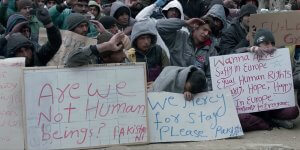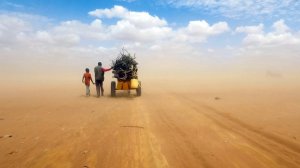“There is no refugee crisis, only a human crisis.” – Ai Wei Wei
Filmed over a single year with 25 film crews and across 23 countries, Human Flow is the ambitious documentary by controversial artist Ai Wei Wei. The film, which had its international premiere at the Venice Film Festival last year, follows the lives and stories of millions of migrants on their journeys across the planet. Human Flow attempts to capture a comprehensive view of the greatest human displacement since World War II, filming and interviewing migrants in Greece, Italy, France, Jordan, from Iraq, Afghanistan, Syria, Kenya, Gaza and many other places not often covered by the media.

While noting the film’s cultural and political significance, I didn’t find it as powerful as it is intended to be, perhaps because many of the distressing images used have become ubiquitous and banal in our culture’s media. However, some audiences may find it more impactful than others. Certainly, Human Flow boasts some innovative and striking visuals, and the use of drone footage heightens the film’s aesthetic appeal. Human Flow is more of an artistic exploration of the world in which so many millions struggle to find safety and identity. The film’s use of sound is particularly intriguing, and scenes of quiet juxtaposed against the deafening roars of the unforgiving ocean, or an army helicopter overhead, create moments for deep contemplation of the beauty found in a world of inequality and chaos. Indeed, some of the film’s most staggering moments are those of silence, often showing a person simply staring into the camera, presented in a sobering and unmediated way.

The film lacks somewhat in a coherent narrative, in its attempt to snapshot the lives of so many individuals across such a vast landscape. However, it makes up for this in the moments Ai is in front of the camera. Ai’s presence is humbling, amusing, and adds a personal element to film, as he shares in the migrants’ journeys along barbed-wire borders, rushing river crossings and muddied makeshift camps.
Human Flow takes a humanitarian stance, showing the suffering and hardships faced by the refugees and their reasons for leaving; the film doesn’t present them as the problem, but rather presents the problems they face, trapped in bureaucratic and physical limbo between countries that don’t want to hear any more about them. This film puts a human face to the statistics and detached media stories, humanising the headlines we are so used to reading. The importance of this kind of film cannot be unstated, particularly in the world’s current political climate. Human Flow is a reminder of our own privilege, and of the sheer number of people moving around the planet at any one time seeking a better life. It is a reminder that the world is shrinking and that we will all inevitably need to learn to live together in closer proximity, and that ultimately, the people so quickly demonised for political gain are really just people like us.
I rate this film 7/10.
Human Flow is out 15th March.






